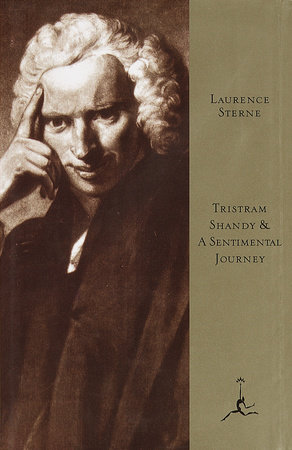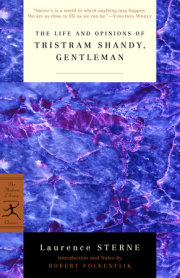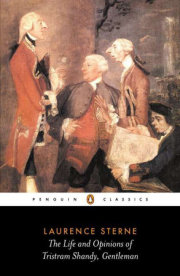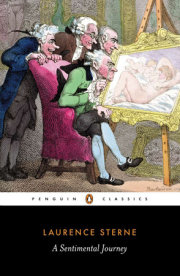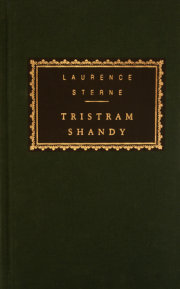CHAPTER I
I wish either my father or my mother, or indeed both of them, as they were in duty both equally bound to it, had minded what they were about when they begot me; had they duly considered how much depended upon what they were then doing;--that not only the production of a rational Being was concerned in it, but that possibly the happy formation and temperature of his body, perhaps his genius and the very cast of his mind;--and, for aught they knew to the contrary, even the fortunes of his whole house might take their turn from the humours and dispositions which were then uppermost:----Had they duly weighed and considered all this, and proceeded accordingly,----I am verily persuaded I should have made a quite different figure in the world from that in which the reader is likely to see me.--Believe me, good folks, this is not so inconsiderable a thing as many of you may think it;--you have all, I dare say, heard of the animal spirits, as how they are transfused from father to son, &c. &c.--and a great deal to that purpose:--Well, you may take my word that nine parts in ten of a man's sense or his nonsense, his successes and miscarriages in this world depend upon their motions and activity, and the different tracks and trains you put them into, so that when they are once set a-going, whether right or wrong, 'tis not a halfpenny matter,--away they go cluttering like hey-go-mad; and by treading the same steps over and over again, they presently make a road of it, as plain and as smooth as a garden-walk, which, when they are once used to, the devil himself sometimes shall not be able to drive them off it.
Pray, my dear, quoth my mother, have you not forgot to wind up the clock?----Good G--! cried my father, making an exclamation, but taking care to moderate his voice at the same time,----Did ever woman, since the creation of the world, interrupt a man with such a silly question? Pray, what was your father saying?----Nothing.
CHAPTER II
----Then, positively, there is nothing in the question that I can see, either good or bad.----Then let me tell you, Sir, it was a very unseasonable question at least,--because it scattered and dispersed the animal spirits, whose business it was to have escorted and gone hand-in-hand with the HOMUNCULUS, and conducted him safe to the place destined for his reception.
The HOMUNCULUS, Sir, in however low and ludicrous a light he may appear, in this age of levity, to the eye of folly or prejudice;----to the eye of reason in scientific research, he stands confessed----a BEING guarded and circumscribed with rights:----The minutest philosophers, who, by the bye, have the most enlarged understandings, (their souls being inversely as their enquiries), shew us incontestably, That the HOMUNCULUS is created by the same hand,--engendered in the same course of nature,--endowed with the same locomotive powers and faculties with us:----That he consists, as we do, of skin, hair, fat, flesh, veins, arteries, ligaments, nerves, cartilages, bones, marrow, brains, glands, genitals, humours, and articulations;----is a Being of as much activity,----and, in all senses of the word, as much and as truly our fellow creature as my Lord Chancellor of England.--He may be benefited, he may be injured,--he may obtain redress;--in a word, he has all the claims and rights of humanity which Tully, Puffendorff, or the best ethic writers allow to arise out of that state and relation.
Now, dear Sir, what if any accident had befallen him in his way alone?----or that, through terror of it, natural to so young a traveller, my little gentleman had got to his journey's end miserably spent;----his muscular strength and virility worn down to a thread;--his own animal spirits ruffled beyond description,----and that in this sad disordered state of nerves, he had laid down a prey to sudden starts, or a series of melancholy dreams and fancies for nine long, long months together.----I tremble to think what a foundation had been laid for a thousand weaknesses both of body and mind, which no skill of the physician or the philosopher could ever afterwards have set thoroughly to rights.
CHAPTER III
To my uncle Mr. Toby Shandy do I stand indebted for the preceding anecdote, to whom my father, who was an excellent natural philosopher, and much given to close reasoning upon the smallest matters, had oft, and heavily complained of the injury; but once more particularly, as my uncle Toby well remembered, upon his observing a most unaccountable obliquity, (as he called it) in my manner of setting up my top, and justifying the principles upon which I had done it,--the old gentleman shook his head, and in a tone more expressive by half of sorrow than reproach,--he said his heart all along foreboded, and he saw it verified in this, and from a thousand other observations he had made upon me, That I should neither think nor act like any other man's child:----But alas! continued he, shaking his head a second time, and wiping away a tear which was trickling down his cheeks, My Tristram's misfortunes began nine months before ever he came into the world.
----My mother, who was sitting by, looked up,--but she knew no more than her backside what my father meant,--but my uncle, Mr. Toby Shandy, who had been often informed of the affair,--understood him very well.
CHAPTER IV
I know there are readers in the world, as well as many other good people in it, who are no readers at all,--who find themselves ill at ease, unless they are let into the whole secret from first to last, of everything which concerns you.
It is in pure compliance with this humour of theirs, and from a backwardness in my nature to disappoint any one soul living, that I have been so very particular already. As my life and opinions are likely to make some noise in the world, and, if I conjecture right, will take in all ranks, professions, and denominations of men whatever,--be no less read than the Pilgrim's Progress itself--and, in the end, prove the very thing which Montaigne dreaded his essays should turn out, that is, a book for a parlour window;--I find it necessary to consult everyone a little in his turn; and therefore must beg pardon for going on a little further in the same way: For which cause, right glad I am that I have begun the history of myself in the way I have done; and that I am able to go on tracing everything in it, as Horace says, ab Ovo.
Horace, I know, does not recommend this fashion altogether: But that gentleman is speaking only of an epic poem or a tragedy;--(I forget which)--besides, if it was not so, I should beg Mr. Horace's pardon;--for in writing what I have set about, I shall confine myself neither to his rules, nor to any man's rules that ever lived.
To such, however, as do not choose to go so far back into these things, I can give no better advice than that they skip over the remaining part of this Chapter; for I declare beforehand, 'tis wrote only for the curious and inquisitive.
--------------------Shut the door.-------------------- I was begot in the night, betwixt the first Sunday and the first Monday in the month of March, in the year of our Lord one thousand seven hundred and eighteen. I am positive I was.----But how I came to be so very particular in my account of a thing which happened before I was born, is owing to another small anecdote known only in our own family, but now made public for the better clearing up this point.
My father, you must know, who was originally a Turkey merchant, but had left off business for some years, in order to retire to, and die upon, his paternal estate in the county of --------, was, I believe, one of the most regular men in everything he did, whether 'twas matter of business, or matter of amusement, that ever lived. As a small specimen of this extreme exactness of his, to which he was in truth a slave,--he had made it a rule for many years of his life,--on the first Sunday night of every month throughout the whole year,--as certain as ever the Sunday night came,----to wind up a large house clock which we had standing upon the backstairs head, with his own hands:--And being somewhere between fifty and sixty years of age at the time I have been speaking of,--he had likewise gradually brought some other little family concernments to the same period, in order, as he would often say to my uncle Toby, to get them all out of the way at one time, and be no more plagued and pestered with them the rest of the month.
It was attended but with one misfortune, which, in a great measure, fell upon myself, and the effects of which I fear I shall carry with me to my grave; namely, that, from an unhappy association of ideas which have no connection in nature, it so fell out at length, that my poor mother could never hear the said clock wound up,--but the thoughts of some other things unavoidably popped into her head,--and vice versa:--which strange combination of ideas the sagacious Locke, who certainly understood the nature of these things better than most men, affirms to have produced more wry actions than all other sources of prejudice whatsoever.
But this by the bye.
Now it appears, by a memorandum in my father's pocketbook, which now lies upon the table, 'That on Lady Day, which was on the 25th of the same month in which I date my geniture,--my father set out upon his journey to London with my eldest brother, Bobby, to fix him at Westminster school;' and, as it appears from the same authority, 'That he did not get down to his wife and family till the second week in May following'--it brings the thing almost to a certainty. However, what follows in the beginning of the next chapter puts it beyond all possibility of doubt.
--------But pray, Sir, What was your father doing all December,--January, and February?----Why, Madam,--he was all that time afflicted with a Sciatica.
CHAPTER V
On the fifth day of November, 1718, which to the era fixed on, was as near nine calendar months as any husband could in reason have expected,--was I Tristram Shandy, Gentleman, brought forth into this scurvy and disastrous world of ours.--I wish I had been born in the Moon, or in any of the planets (except Jupiter or Saturn, because I never could bear cold weather) for it could not well have fared worse with me in any of them (though I will not answer for Venus) than it has in this vile, dirty planet of ours,--which o' my conscience, with reverence be it spoken, I take to be made up of the shreds and clippings of the rest;----not but the planet is well enough, provided a man could be born in it to a great title or to a great estate; or could anyhow contrive to be called up to public charges, and employments of dignity or power;--but that is not my case;----and therefore every man will speak of the fair as his own market has gone in it;--for which cause I affirm it over again to be one of the vilest worlds that ever was made;--for I can truly say, that from the first hour I drew my breath in it, to this, that I can now scarce draw it at all, for an asthma I got in skating against the wind in Flanders;----I have been the continual sport of what the world calls fortune; and though I will not wrong her by saying, She has ever made me feel the weight of any great or signal evil;--yet with all the good temper in the world, I affirm it of her, that in every stage of my life, and at every turn and corner where she could get fairly at me, the ungracious Duchess has pelted me with a set of as pitiful misadventures and cross accidents as ever small HERO sustained.
Copyright © 2000 by Laurence Sterne. All rights reserved. No part of this excerpt may be reproduced or reprinted without permission in writing from the publisher.

